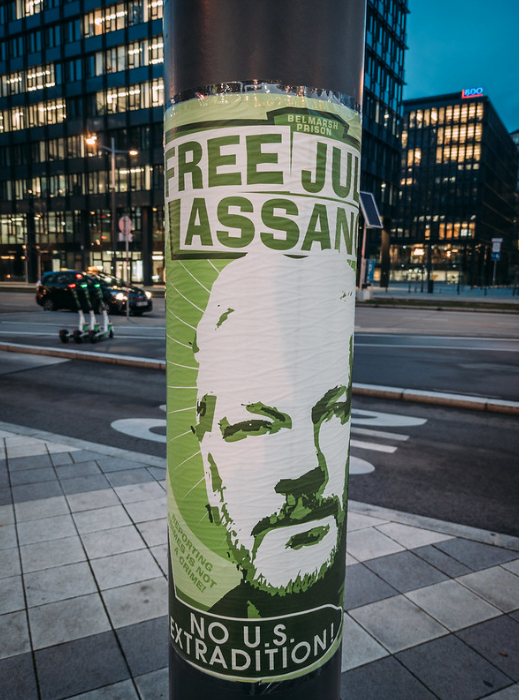
>> See even part 2 and part 3.
By Mikael Böök, Isnäs, Finland
Presently, I am trying to find supporters of Assange and WikiLeaks among the librarians. I’m sure there are some. Indeed, there must be many! Think of it, librarians are educated and enlightened people, who support democracy and therefore promote access to information. Yet all those providers of access to information, the public librarians, are evidently keeping their sympathy for Julian Assange for themselves, deep in their hearts… Because when one tries to dig up some evidence of their sympathy from the public sphere, it is like looking for the famous needle in the haystack!
By the way, what would the public sphere be without the librarians and their libraries? Certainly not a democratic one, anyway. Sadly, however, one must also admit that the public sphere can be very undemocratic in spite of the existing libraries and librarians.
I have to modify what I wrote above a little because sometimes one actually finds the needle (although the probability is as low as that of winning the Jackpot).
Once upon a time the library associations of Norway did, in fact, make a common public statement. They said:
«It is a fundamental principle of a democracy that the population should have insight into the decisions and decision-making processes that concern them. Open societies are an obstacle to corruption and abuse of power. WikiLeaks has contributed to increased transparency for the general public by bringing to the public conditions that deserve to be criticized. Attempts to close WikiLeaks are characterized by hasty reactions, which as of today have not been sanctioned in any courtroom. This could threaten freedom of information.» (I am responsible for the tentative translation of this passage from Norwegian into English).
But that was back in 2010, and today that rare needle has lost its thread and guiding principle. Or so it seems because the WikiLeaks and its founder Julian Assange need our support more than ever now, in 2021. Where is our necessary support now?
FAIFE, the committee within IFLA (International Federation of Library Association and Institutions) was founded to defend and promote …
… the basic human rights defined in Article 19 of the United Nations Universal Declaration of Human Rights (FAIFE stands for Freedom of Access to Information and Freedom of Expression). One would think that FAIFE should have said something about the ordeal of Julian Assange, especially since the UN rapporteur for human rights, Nils Melzer, came forth (in 2018) with his conclusion, based on many years of research into the case, that Assange has been subject of torture.
Unfortunately, the campaign against Julian Assange in the mass media has been very effective, and the FAIFE has not dared to deviate from the mainstream propaganda. Why?
I think that, behind the political narratives and the usual political caution, not to say cowardliness, of the librarians, there is a deeper reason. In WikiLeaks and Julian Assange, we fear a competitor and a rival. WikiLeaks has actually provided the public with a huge document library. Given the digitalized mode of information, the leaks of the WikiLeaks should, and they easily could, be part of our collections. The question we need to ask ourselves is: Where and by whom do we think that the library of WikiLeaks should be preserved and made accessible, if not by us, the librarians?
Obviously, WikiLeaks does some things better than we do, especially when it comes to defending the democracy. Moreover, WikiLeaks is as universalistic as the internet and as the library itself. But we do not want to admit that WikiLeaks is like us, although in some respects more advanced and better. Instead, we prefer to combat our new rival and to ally with our national governments and their military-industrial-academic complexes.
In 2010, when WikiLeaks had released the video «Collateral Murder«, the US Library of Congress set a very bad example by denying access to WikiLeaks from inside their library. That provoked a strong reaction from an American group of librarians called The Progressive Librarians Guild. A Norwegian librarian and former president of the Norwegian Library Association, Frode Bakken, recently re-circulated that old statement of the PLG via the mailing list of the Norwegian librarians. With this additional needle he also incited me to write something myself.
Another inspiration is the photo that Anders (my co-blogger) found for this writing. Does the luminous poster with the message «Free Julian Assange!» stand in some city somewhere on this earth? Or has it been dreamed up by the photographer (Ivan Radic), and inserted into the street landscape by means of Photoshop or similar? Be that as it may, those posters are all too rare.
Imagine a poster like that in front of your city library, and even inside! If luminous poles would prove too big a burden for the library budget, even inflatable ones, or just wall posters, would do. Let’s put them up in the libraries until Julian Assange is free to keep up his important work for democracy!